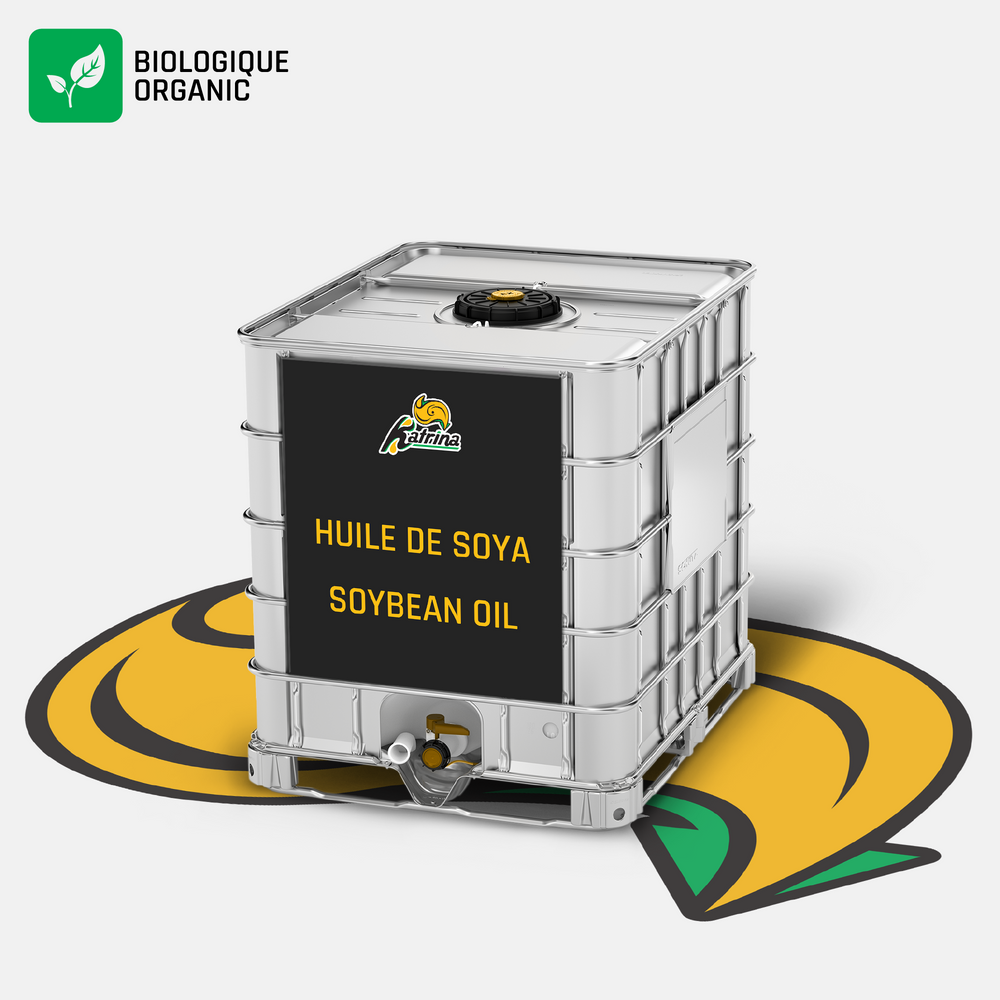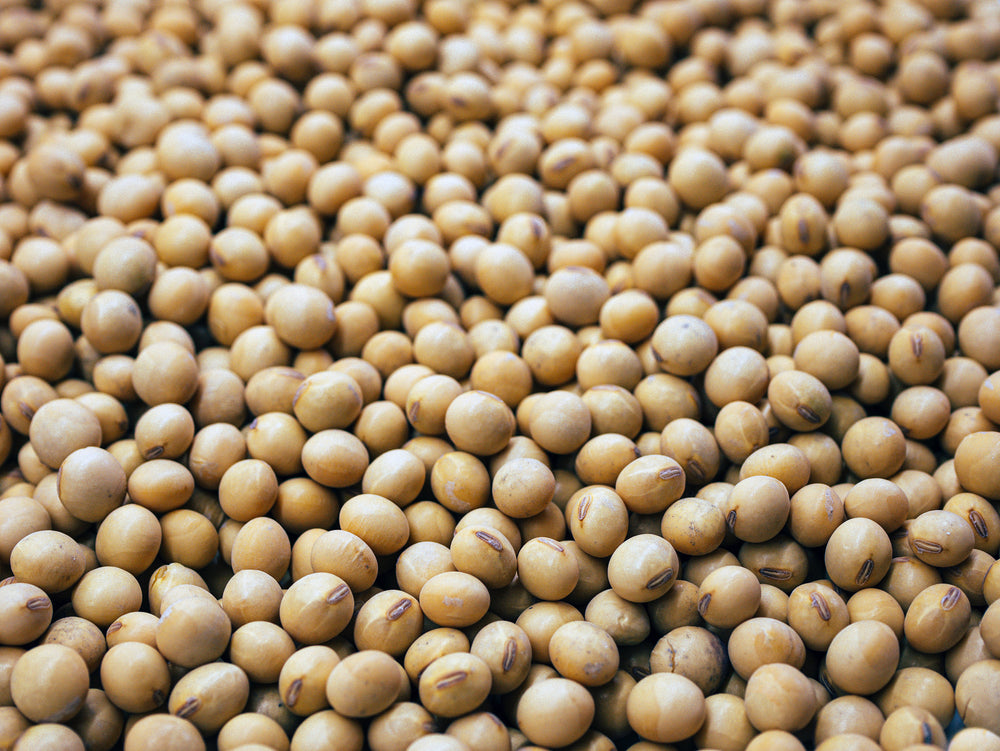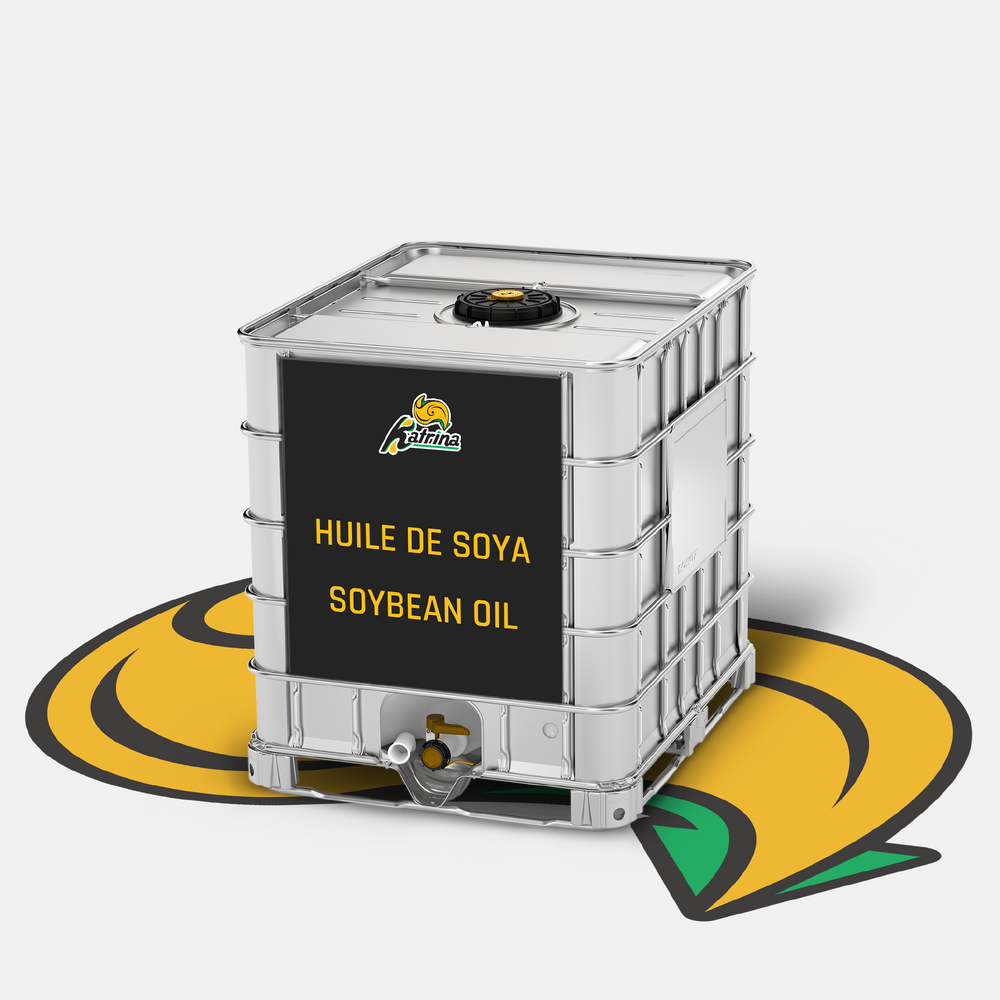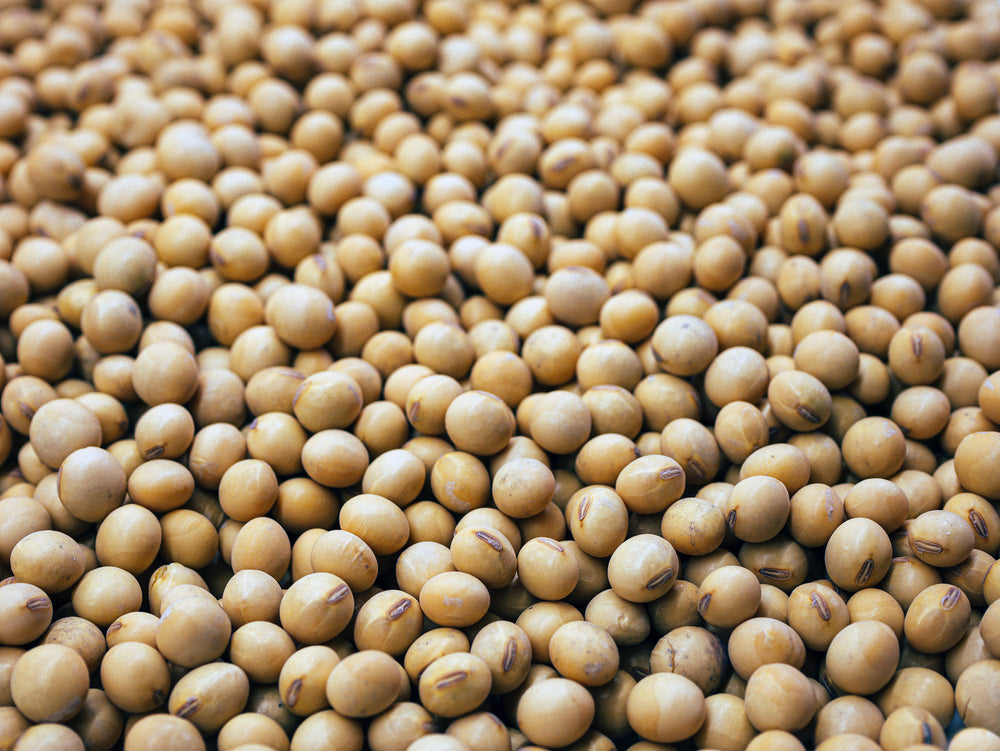Why Buy Organic Soybean Oil: Pros and Cons
Organic soybean oil is gaining serious attention from chefs, food manufacturers, and health-conscious brands, but is it actually better than regular oil?
We break down the pros and cons of organic soybean oil, including how it compares to conventional options, where it shines in commercial kitchens, and whether it’s worth the investment for your business.
What is Organic Soybean Oil?
Organic soybean oil is a premium vegetable oil extracted from soybeans that are certified organic. This means they're grown without synthetic pesticides, herbicides, fertilizers, or genetically modified organisms (GMOs).
Unlike conventional oils, which often use chemical solvents like hexane, organic soybean oil is typically produced using expeller-pressed or cold-pressed mechanical methods. This process ensures it contains no chemical residues and helps preserve its natural integrity.
The Canadian Organic Standards, regulated by the Canadian Food Inspection Agency (CFIA), require that organic products be grown using practices that enhance soil health, biodiversity, and ecological harmony, with no use of prohibited substances on the land for a minimum of 36 months prior to harvest.
In fact, Canadian organic food sales reached $8 billion in 2022, highlighting the rising demand for clean-label products across restaurant menus, packaged snacks, and private-label grocery offerings.
Pros and Cons At A Glance
The Pros of Organic Soybean Oil (Why It's Worth It)
Choosing organic soybean oil means selecting a value-aligned product that meets multiple operational goals. Its advantages extend far beyond just being an ingredient:
- Purity: Produced without GMOs, synthetic pesticides, or chemical solvents like hexane, it offers a clean production process that appeals to consumers and operators seeking fewer additives.
- Nutritional Value: It's rich in heart-healthy polyunsaturated fats (omega-3 and omega-6 fatty acids) and naturally occurring vitamin E, retained due to minimal processing. This profile is a win for products marketed as heart-smart, plant-based, or clean-label.
- Flexibility: It handles heat exceptionally well, maintains stability during production, and has a neutral flavour that won't alter dish outcomes. This makes it an easy and strategic upgrade for existing recipes.
- Brand Differentiator: Organic certification opens doors to new retail placements, builds consumer trust, and enhances advertising copy. For restaurants, it supports a broader story about ingredient quality and ethical sourcing.
In essence, organic soybean oil provides top performance, trustworthiness, and a marketing edge in one package.
Cons of Organic Soybean Oil
While the benefits are significant, it's important to acknowledge the minor tradeoffs:
- Cost: Organic soybean oil commands a higher price due to stricter farming standards, lower yields, and more labour-intensive extraction methods. However, this can be offset by premium pricing, increased customer loyalty, and access to new markets that demand organic inputs.
- Shelf Life: Minimally processed and lacking synthetic preservatives, it typically has a shorter storage window than ultra-refined conventional oils. In commercial settings with high volume turnover and proper storage (bulk tanks, temperature-controlled environments), this is rarely an issue.
Despite being slightly more expensive and requiring attentive inventory management, organic soybean oil performs similarly to conventional options, but with the added benefits of being cleaner, safer, and better for your brand.
Organic Soybean Oil vs. Regular Soybean Oil: A Detailed Look
At first glance, organic and regular soybean oil might look similar, but their sourcing, processing, and performance are vastly different.
Regular soybean oils are often made from genetically modified soybeans treated with synthetic chemicals. The oil is typically extracted using hexane, a petroleum-derived solvent, then refined, bleached, and deodorized.
By contrast, the production of organic soybean oil relies on mechanical pressing, which means no chemical solvents are used. This method is crucial because it helps retain more of the oil's natural nutrients and antioxidants, making it:
- Non-GMO by definition
- Free of synthetic chemical residues
- Rich in omega-3s and vitamin E
A study published on PubMed found that unrefined organic soybean oil retains significantly higher levels of alpha-tocopherol (vitamin E) compared to refined conventional soybean oil, making it a nutritionally superior choice for operations that prioritize ingredient quality.
Side-by-Side Comparison

Organic vs. Natural vs. Non-GMO: What's the Difference?
Understanding labeling is key when sourcing ingredients:
| Label | What It Means |
| Organic | Certified by the CFIA or another governing body. |
| No GMOs, synthetic chemicals, or prohibited substances. | |
| Must follow strict growing and processing standards. | |
| Non-GMO | Avoids genetically modified inputs. |
| May still use synthetic pesticides or fertilizers. | |
| Natural | No specific legal definition. |
| May still contain GMOs or chemical residues. |
While many oils claim to be “natural” or “non-GMO,” only certified organic soybean oil guarantees full compliance with organic protocols, providing the documentation and traceability that food manufacturers increasingly require.
Nutritional Information: Is Organic Soybean Oil Good or Bad For You?
Organic soybean oil provides real nutritional value, backed by research. It's rich in essential fatty acids and naturally occurring antioxidants, and it's free from harmful residues.
This makes it a compelling choice for restaurants and food manufacturers targeting health-conscious customers.
A single tablespoon (14g) of organic soybean oil contains approximately:
| Nutrient | Per Tbsp (14g) |
| Total Fat | 14g |
| Saturated Fat | 2g |
| Polyunsaturated Fat | 8g |
| Omega-6 (linoleic) | 7g |
| Omega-3 (alpha-linolenic) | 0.9g |
| Vitamin E | 1.1mg |
Naturally Rich in Omega-3 and Omega-6 Fatty Acids
A key benefit of organic soybean oil is its healthy fat profile. It's high in polyunsaturated fats, especially alpha-linolenic acid (ALA), a plant-based omega-3 fatty acid linked to cardiovascular support and reduced inflammation.
These beneficial fats are crucial for maintaining healthy cholesterol levels, supporting cognitive function, and reducing the risk of chronic disease, all without the need for synthetic enrichment.
Free from Hexane, Additives, and Trans Fats
Most regular soybean oils are refined with solvents like hexane, then bleached and deodorized to improve shelf life. While legal and completely safe for consumption, the refining process can destroy some naturally occurring nutrients.
Organic soybean oil avoids these concerns. Because it's mechanically extracted and minimally refined, it naturally contains zero trans fats, no artificial preservatives, and no added colourants or stabilizers.
Ideal for Clean-Label Products and Health-Forward Menus
More consumers are actively avoiding oils perceived as “ultra-processed.” Organic soybean oil helps meet these expectations, making it suitable for:
- Plant-based food manufacturing
- Functional snacks and bars
- School, hospital, or wellness-based food service
- Meal kits and premium delivery brands
Environmental Impact of Organic Soybean Oil
Beyond nutrition, organic soybean oil contributes to a sustainable supply chain. For modern food operations, especially those with ESG (Environmental, Social & Governance) or sustainability commitments, ingredient sourcing is critical, and oils are a significant category.
No Synthetic Fertilizers or Pesticides in Farming
Certified organic soybean farms are prohibited from using synthetic fertilizers, herbicides like glyphosate, or neonicotinoid-based pesticides. This significantly reduces chemical runoff into waterways, improves soil biodiversity, and prevents harmful residues from entering the food system.
According to the Canadian Organic Standards and guidelines supported by the Organic Federation of Canada (OFC), organic soybean farming contributes to:
- Preserving soil fertility and structure
- Supporting beneficial insect populations
- Enhancing carbon sequestration through crop rotation
These outcomes reflect measurable benefits aligned with the principles of regenerative organic agriculture in Canada.
Lower Carbon Footprint and Water Pollution Risk
Industrial soybean farming has been linked to deforestation and nitrogen runoff. Organic practices mitigate these effects through:
- Cover cropping
- Mechanic weed control
- No synthetic nitrogen or phosphorus use
Culinary and Commercial Uses for Organic Soybean Oil
Organic soybean oil has become a preferred choice in professional kitchens and commercial production lines due to its rare combination of stability, neutrality, and clean-label appeal. It balances high performance with transparency.
In hot kitchens, its smoke point around ~450∘F (232∘C) makes it stable for high-heat applications like deep frying and sautéing. It resists burning, clouding, or separating, ensuring consistency and safety.
For cold line applications, its light, neutral flavour seamlessly integrates into dressings, marinades, and emulsions, allowing bolder ingredients to shine. This is invaluable for co-packers and food developers creating organic mayonnaise, vinaigrettes, or plant-based spreads.
In baking, its consistent fat profile and smooth texture make it suitable for muffins, cookies, crackers, and breads, particularly in vegan or allergen-conscious formulas. Snack manufacturers also use it for kettle-cooked chips, popcorn, and granola bars to enhance crunch and mouthfeel while keeping labels simple.
Organic soybean oil delivers the same high performance in cooking, blending, baking, and frying as conventional options, while supporting product claims that modern customers trust. This is why it's increasingly found in institutional kitchens, plant-based food lines, and clean-label snack aisles.
Is Organic Soybean Oil Right for Your Business?
Organic soybean oil is no longer a niche product; it's a mainstream solution for operations seeking performance without compromise and a cleaner supply chain without sacrificing consistency.
The key question is how well it aligns with your business values and customer expectations.
- If you cater to health-conscious diners, sell clean-label snacks, or formulate private-label sauces and dressings, organic soybean oil is likely the right choice. It offers all the functional benefits of conventional oils, high-heat tolerance, neutral flavour, smooth blending, while supporting certified organic labeling and non-GMO marketing claims. This combination is particularly rare and valuable for an oil available in bulk and easily integrated into existing production systems.
- For restaurants, it provides a competitive edge, especially in vegan, gluten-free, and wellness-driven menus where diners increasingly scrutinize ingredients. For food manufacturers, organic certification opens new distribution channels, strengthens your brand story, and eliminates concerns about trace solvents or synthetic inputs that could derail clean-label positioning.
- Operationally, organic soybean oil is plug-and-play. It doesn't require new equipment or special training, it stores and dispenses just like any other oil, especially with a supportive supplier. Whether you're producing large volumes of organic popcorn or running busy fryer shifts, the oil performs with the same reliability and yield as conventional products.
If you're looking for an oil that aligns with modern consumer expectations, supports sustainable sourcing, and performs reliably in the kitchen, organic soybean oil is an excellent choice.
When sourced from a reliable partner like Distribution Katrina, it becomes not just a better ingredient, but a better operational decision. In a market that rewards quality, responsibility, and consistency, switching to organic soybean oil is a smart move.
Frequently Asked Questions
Is organic soybean oil gluten-free?
Yes. Soybean oil is naturally gluten-free, and our certified organic soybean oil is produced without any gluten-containing additives or cross-contamination. It’s suitable for gluten-free kitchens and packaged goods.
Can I use organic soybean oil in high-volume frying?
Absolutely. With a smoke point around 450°F (232°C), organic soybean oil performs extremely well in commercial fryers, offering long-lasting stability and neutral flavour. It’s an excellent fit for quick- service restaurants (QSRs), ghost kitchens, and institutional dining operations.
Is organic soybean oil healthier than regular soybean oil?
Yes. Organic soybean oil retains more of its natural nutrients, like vitamin E and omega-3 fatty acids, because it’s mechanically pressed and minimally refined. It’s also free from chemical residues like hexane, which are used in the refinement process of conventional oils.
Does Distribution Katrina deliver nationwide?
Yes. We offer bulk oil delivery across Canada and the United States, with customized scheduling to match your kitchen’s volume and operational flow. Whether you’re in a metro area or a more remote region, we’ve got you covered.
Do you offer other organic oils besides soybean?
We do. In addition to organic soybean oil, we supply organic canola, organic sunflower, and organic olive oil. If you have specific sourcing needs, we’re happy to help find the right solution for your menu or manufacturing run.
Can you install storage tanks for my kitchen or facility?
Yes. We offer full-service bulk tank installations with support from our team, including sizing, plumbing, safety guidance, and refills. Whether you need a small-volume tank or a multi-line system, we’ll make it work for your space.








